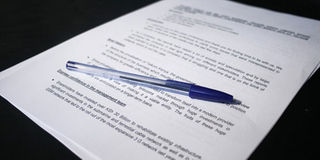When did you last update your CV?

PHOTO / FILE A copy of a CV.
What you need to know:
- Your career profile also requires frequent updating. A career profile indicates why you are perfect for the job, summarising what you are capable of and the qualifications that you bring to that position.
Many of us rarely go through our CVs to update them with fresh information. At best, we hurriedly sift through the document when an advertisement comes up for a job we are interested in.
We quickly adjust the details to the present job title, and if we remember, we add an equally hurried referee at the end.
We may not even have the time to confirm the details that we have put down. After sending out our applications, we don’t hear from the recruiting firm or the employer, and we wonder why.
Don’t we all update our wardrobes when clothes get small, old, or when we have a life-changing moment? We should give our careers and job search similar attention, if not more.
It is necessary to constantly update and revamp your CV, and not wait until a new job is advertised. We should add new information about our careers as they happen, such as a new certificate or a fresh skill. You might have planned a workshop for the first time and it all went impressively. Therefore, you may add organisation skills to your CV.
REORGANISATION
A job loss or reorganisation might require that you to update your CV.
You will realise that if you have been updating your CV immediately a change occurs, you will be saved the hustle of having to run around at the last minute to obtain information. It could be the dates of certain events, your referees’ shifting details, contacts of past companies that you may have worked for, and so on.
You might be thinking that your CV needs a major overhaul, but even after this, you will still need to constantly update it for ease or reference. Here are a few things that will need frequent adjustments.
The first part is obviously the contact information. Ensure that your number is updated and that any other alternative numbers are still in use, such as your next of kin’s telephone number.
Second, you should ensure that you have a professional email address. The ideal email should have your official name and not your childhood or teenage nickname.
CAREER PROFILE
Your career profile also requires frequent updating. A career profile indicates why you are perfect for the job, summarising what you are capable of and the qualifications that you bring to that position.
A profile should at all times capture the interest of the employer, meaning that it must be relevant to the prevailing requirements. Objective statements talk about what you want in a job, while the career profile outlines your capabilities, explaining why you are the right fit.
Your key skills and expertise should also be updated as soon as necessary. This section lists the skills and knowledge that you bring to a job. For example, it will list your ability to negotiate contracts with vendors if you are a procurement professional or skills in budgeting if you are in the finance profession.
This section will require you to always ask yourself what each skill will benefit every potential employer. It is mostly divided into two parts — the general skills that every employee should have and the specific skills that are unique to your situation.
Universities and college have registered an upsurge in students who are either taking diploma, degree, or Master’s courses and with this, the education column keeps changing. Therefore, additional qualifications must be included as soon as they are required.
When making adjustments to your academic qualifications, make sure to include institution, grade attained, and the years or months attended. You should not make the potential employer go through the trouble of contacting you concerning your academic details.




